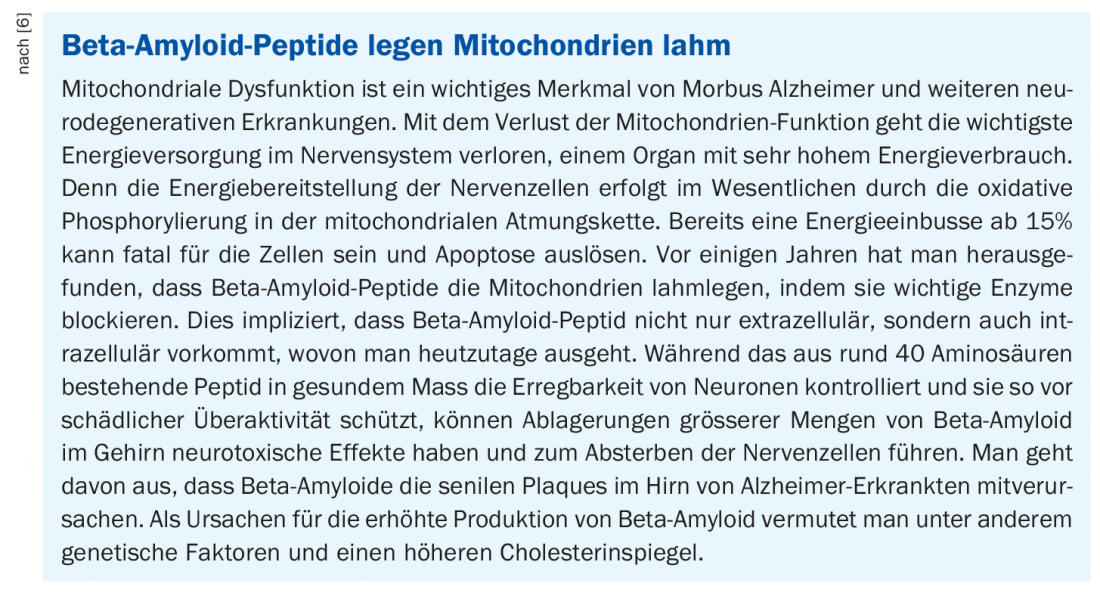New study data show that mitochondrial changes occur in the early stages of dementia (“Mild Cognitive Impairment”, MCI), which can be influenced by therapy with donepezil. Compared with MCI patients treated with the acetylcholinesterase inhibitor, those without treatment had significantly lower mitochondrial cellular respiration. Moreover, donepezil also altered the expression of genes involved in mitochondrial regulation in muscle.
In Alzheimer’s dementia, there is a progressive breakdown of nerve cells and signals in the brain. Protein deposits consisting of beta-amyloid peptides, are one of the most noticeable changes in the brains of Alzheimer’s patients. Mild cognitive impairment (“MCI”) is considered a prodromal or risk syndrome of dementia [1]. In ICD-11, the corresponding diagnostic classification is “mild neurocognitive disorder” [2,7]. In approximately 5-10%, MCI progresses to Alzheimer’s disease or another form of dementia; in others, cognitive abilities remain stable over time or improve again [3]. Systemic mitochondrial dysfunction is a finding associated with Alzheimer’s disease and other neurodegenerative disorders (box).

Study in patients over 60 years of age with mild cognitive impairment.
Reducing vascular, metabolic, toxic, and psychological risk factors is an important treatment goal in MCI. Investigators of a new cross-sectional study examined the efficacy of the acetylcholinesterase inhibitor donepezil on mitochondrial activity and cognitive function in MCI patients over 60 years of age [4]. Some of the participants received donepezil at least one month before the study (n=15), while others were not treated for cognitive impairment (n=11). The groups with cognitive impairment were compared with a control group of cognitively healthy adults (n=24) matched for age, sex, and weight [4,5]. Volunteers participated in an exercise test on a treadmill that measured their physical performance. They were also given a fitness tracker to wear at home for seven days. The research team measured mitochondrial function in the participants’ muscles using permeabilized tissue samples from biopsies of the vastus lateralis muscle. This showed that in the untreated group, the skeletal muscles had significantly lower mitochondrial cellular respiration than the donepezil-treated MCI patients and than the healthy controls [4]. Donepezil altered the expression of several genes in the treated group, including those involved in mitochondrial regulation and function, fatty acid metabolism, and protein synthesis in muscle. Comparison of RNA sequencing of skeletal muscles from the untreated and donepezil-treated MCI patients revealed that the acetylcholinesterase inhibitor altered gene expression for proteins from over 600 skeletal muscles, with a massive impact on the transcriptional profile of the corresponding muscles.
Literature:
- DGPPN/DGN: S3-Leitlinie “Demenzen”, 2016, long version. www.dgppn.de (last call 22.12.2021)
- Kasper S, et al: Management of mild cognitive impairment (MCI): The need for national and international guidelines. The World Journal of Biological Psychiatry 2020; 21 (8): 579-594.
- Huber F, Beise U: Dementia. Last revised: 03/2017. www.medix.ch/wissen/guidelines/psychische-krankheiten/demenz (last call 22.12.2021)
- Morris JK, et al: Mild Cognitive Impairment and Donepezil Impact Mitochondrial Respiratory Capacity in Skeletal Muscle. Function (Oxf) 2021; 2(6): zqab045.
- “Alzheimer’s Drug May Help Maintain Mitochondrial Function in Muscles as It Slows Cognitive Decline,” American Physiological Society, Sept. 27, 2021.
- “Alzheimer’s disease: amyloid-beta impairs mitochondria,” Gesundheitsindustrie BW, Nov. 10, 2014, www.gesundheitsindustrie-bw.de (last accessed Dec. 22, 2012).
- World Health Organization (WHO): ICD-11, International Classification of Diseases11th Revision, https://icd.who.int/en (last accessed Dec. 22, 2021).
HAUSARZT PRAXIS 2022; 17(1): 28
InFo NEUROLOGY & PSYCHIATRY 2022; 20(2): 36.











